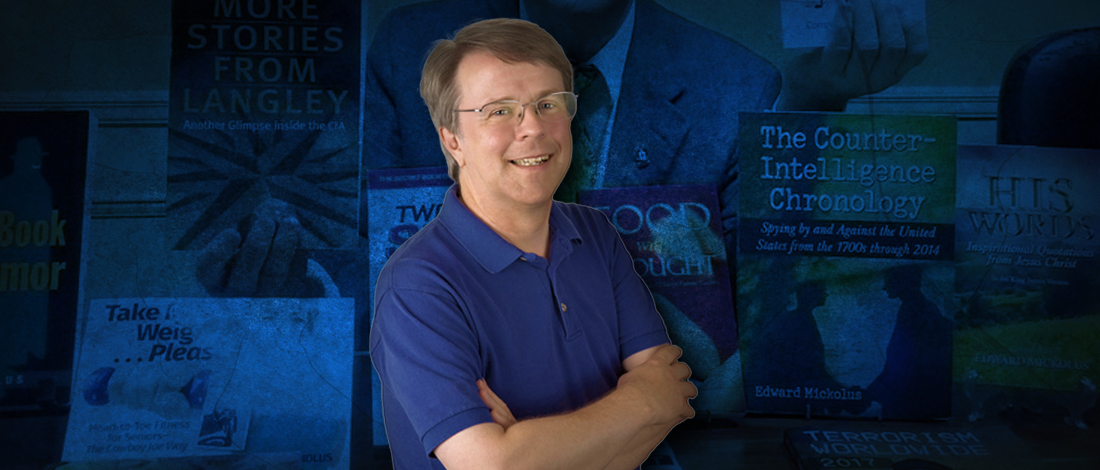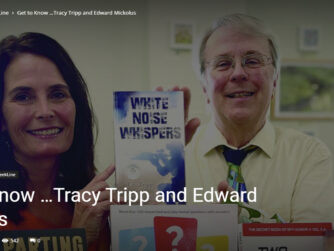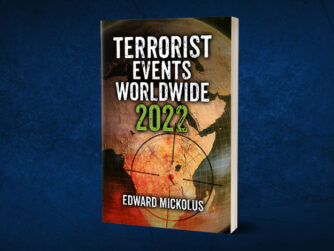Thanks to Tracy Tripp for featuring me in this article she wrote on her website:
I’m excited to feature this month’s author for several reasons. Dr. Edward Mickolus has been an important part of my writing journey.
I met him while at a book signing in Saint Augustine. At the time, I had just finished writing Something Like a Dream, and I needed a beta reader to make sure I got all my CIA parts correct. As luck would have it, Ed was at another table selling his nonfiction books on various topics he will discuss below. He graciously agreed to give his input. I remember his first words being something like, “You need to change all of this from CIA to FBI.”
From there, a friendship was born. He went on to be my beta reader for the sequel, Awaken, and then approached me with an idea. Being a nonfiction author, he was haunted with brilliant fiction ideas, but did not feel as comfortable writing that genre. His idea: An investigator solves crimes after hearing the victims’ voices speaking to him through a walkie talkie. He let me take the idea and run with it, adding suggestions, feedback, and expertise, either his own or other professionals’.
Ed just finished reading my first draft of my novel, Broken Pieces. I’m not sure where I would be as a writer if it were not for his patience and encouragement.
Dr. Edward Mickolus, after graduating from Georgetown University, wrote the first doctoral dissertation on international terrorism while earning an M.A., M.Phil, and Ph.D. from Yale University. He then served in analytical, operational, management, and staff positions in the Central Intelligence Agency for 33 years, where he was CIA’s first full-time analyst on international terrorism; analyzed African political, economic, social, military, and leadership issues; wrote political-psychological assessments of world leaders; and managed collection, counterintelligence, and covert action programs against terrorists, drug traffickers, weapons proliferators, and hostile espionage services.
For the following ten years, he was a senior instructor for SAIC and its spinoff, Leidos, Inc. He founded Vinyard Software, Inc., whose products include ITERATE (International Terrorism: Attributes of Terrorist Events) text and numeric datasets and DOTS (Data on Terrorist Suspects). Clients include 200 universities in two dozen countries.
His 50+ books include a series of multi-volume chronologies and biographies on international terrorism; 31 book chapters; 100 articles and reviews in refereed scholarly journals and newspapers and presentations to professional societies; and 15 humorous publications. Topics include intelligence, inspiration, politics, fitness, education, public speaking, writing, creativity, the UN, and humor.
He served as the Deborah M. Hixon Professor of Intelligence Tradecraft and Board of Advisors member at the Daniel Morgan Graduate School in Washington, DC and teaches at the University of North Florida and Jacksonville University.
He is a recovering standup comic. He is working on a study of the honorees at State of the Union addresses and another on Famous Last Meals, orchestrating two multi-author serial novels by 15 retired and serving CIA officers, compiling the anthology Stories by the Side of the Road, continuing writing two terrorist events and biographies series, and addressing numerous writing groups and civic associations. He and his wife are grandparents.
Visit his author website at www.edwardmickolus.com Remember, buy his books, or the terrorists win!
Questions and Answers:
What book would you like your readers to know more about?
Could we just say that I write in numerous genres on several topics? My most popular books are The Secret Book of CIA Humor, Spycraft for Thriller Writers, Stories from Langley, and my 20 (so far) terrorist events chronologies.
If you were leading a book club, what are three to four questions about your book that you would like to answer for the readers.
As Tracy pointed out above, White Noise Whispers was a joint venture that took us both to places we did not expect, right into the mind of a serial killer. If you visit Tracy’s website, tracytripp.com, she had a list of book club questions that are sure to create riveting conversation.
How many books have you written, and do you have a favorite?
I’m up to 50 books, with 7 more titles on the way. My favorite is always my next book. My favorite to research/conduct interviews for was All the Presidents’ Heroes: Inspirational Stories of State of the Union Honorees. These are the folks who are sitting in the gallery with the First Lady whom the President mentions in the SOTU speech. They have wonderful altruistic stories to tell. Many of them were available for interviews. I’m shopping the book to commercial houses even as we speak.
Have you ever considered writing under a pseudonym, and why or why not?
I’ve heard the arguments for using a pseudo, including that you don’t want to cross-contaminate genres for readers who think of you as noteworthy in a specific field, be it children’s books or hardboiled detective novels. Using the same nom de plume for something completely different from their built-up expectations might frustrate them. I’d rather that readers start with whatever title interests them, then try one of my books in some other field. Maybe that will spur them to say “hey, this guy’s interesting on numerous topics”. This outcome happened to me when I was teaching at the Osher Lifelong Learning Institute (OLLI) at the University of North Florida and its satellite locations. I offered several courses on U.S. intelligence, then moved to creativity techniques for the newly-retired, then moved to prolific writing, then ran a book club on OLLI authors, then coached instructors on public speaking techniques, then on graphics. I found that people who took one of my courses would often show up at my other ones. The same can work for building readership. Write what interests you no matter the format or the genre, show that enthusiasm in your writing, and the readers will follow. And besides, I had enough aliases working at the Agency!
What do the words “writer’s block” mean to you?
It’s an opportunity, not a roadblock. As part of my course on How To Be(come) a Prolific Writer, I discuss the benefits of writing more than one book at a time, and having them at different stages of the production process. As 1950s humorist Richard Armour suggested, you can line up your book projects like planes waiting to take off. One is ready to take off (in the galley/proof copy stage), another is with the acquisition editor/copy editor with you making suggested changes. Another is almost done. Another has maybe the first chapter done. Another has the outline (if you’re an outliner. If you’re a pantser, maybe you’re writing a character bible to at least help with continuity.) in draft. Another is in early research (and my books are always in research). Yet another is just in an “I wonder if this idea could be a book, or a journal article, or a short story, or a poem, or a song, or a greeting card, or something else” stage. Having this many projects at different stages lets you shift from one project—at which perhaps you’ve hit a temporary wall—to another and move that ball down the field toward the goal. You’re still being productive, and right brain has the opportunity to work in the background on other projects while left brain is working on the front burner project. After a few days, you can return to the first project and you’ll magically discover that you’ve resolved whatever issue had been an obstacle to further writerly progress. Having multiple projects going simultaneously keeps your writing and creative juices flowing, helping you avoid boredom, burnout, and writers’ blocks. Whenever one of those killer B’s hits you on one project, just turn to the next—Plan B!
Do you write individually, or prefer collaborating?
(This is adapted from an article I wrote for the North East Florida chapter of Mensa.)
Sometimes you have a great idea for a book, but you know that you’re not the right writer to bring it to fruition, due to limitations of, say, your skill set or the amount of time you can devote to the project. But you don’t want the world to lose your Great Idea. What to do?
One technique is collaborating, or even co-authoring.
There are certain keys to successful collaboration:
First, figure out why you need to collaborate. What skills do you lack that you could find in someone else? If you’re putting together an anthology, what experiences do others have that are more compelling/diverse/relevant than your own?
Second, find someone who complements your skill set. What is it that they bring to the table that adds to what you can do alone? Consider the Economics 101 principle of comparative advantage: What do you do best, and what do they do best—or at least better than you? Are there areas in which you two make up for each other’s deficiencies? What do you do well, but for whatever reason, don’t want to do (Self-editing, indexing, proofreading, and marketing often come to mind for writers.)?
Third, make sure that you respect each other’s contribution. Whenever I’m considering collaborating, I read the other person’s work in the medium in which I’m considering writing—novels, screenplays, nonfiction research on a topic new to me, knowledge of an arcane area, new developments in the business of publishing, and marketing. (Wow. I don’t know a lot! Admitting what you don’t know is crucial to successful partnering.) Tracy, my co-author on White Noise Whispers, has such a gift with language—bon mots, asides, les mots justes, descriptive flourishes, internal monologues, and the like—that I sometimes just sit back and savor what she’s written for the sheer joy of watching a first-class mind in operation.
Fourth, be in constant communication with your partner. Bounce ideas off each other. Read each other’s work and comment extensively on it. Don’t just say “sounds good to me”. You’re trying to put together the best possible product your combined talents can create. My collaborations routinely generate hundreds of e-mails, phone calls, and meetings per project.
Fifth, be clear in what your division of labor/responsibilities will be. If you want a written contract, write one. If it’s a handshake agreement, draft an informal list of who will do what. This list will differ depending upon the skills/interests of your partner for each project. For Take My Weight, Please, I designed the organization of the book and wrote the text. My co-author, a fitness coach, developed the exercises and overall philosophy of the workout program. Another colleague photographed models using the gym equipment. For the Whispers murder mystery, I wrote the character bible (backstories, physical descriptions, and motivations of the 50 characters we used), vestigial chapter-by-chapter plotline, and the initial concept of the book, then contacted psychiatrists, naturalists, and law enforcement professionals who offered insights into investigative tradecraft. Co-author Tracy developed the characters and plot, visited the likely body dump sites for verisimilitude, and wrote the finished product. I co-wrote a how-to book on Model United Nations coaching with my fellow coach, a high school teacher. I’ve done several anthologies (and if you’d like to contribute, contact me about Stories by the Side of the Road) and two spy-fi thrillers with 15 other CIA retirees/novelists.
Sixth, don’t be embarrassed to offer an idea that eventually doesn’t work. Your partner will see things from an entirely different perspective, and could well build upon the idea, or take it in a direction that is ultimately far better than you would have by yourself. That’s why you collaborated in the first place.







